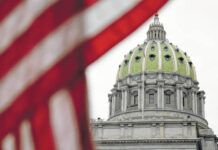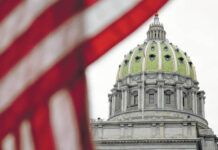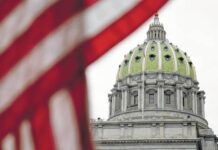Click here to subscribe today or Login.
U.S. Rep. Dan Meuser joined with U.S. Rep. Daniel Webster (FL-11), Tom Reed (NY-23), and Doug LaMalfa (CA-01) this week introduced H.R. 7231 — the Infrastructure Bank for America Act of 2020 — a bill to support wholesale lending to infrastructure projects through state and local governments, state infrastructure banks, and private entities.
“America’s infrastructure is in critical need of modernization,” said Meuser, R-Dallas. “Although there is bipartisan consensus on this issue, the sheer magnitude of needed investment exceeds the budget and borrowing capacity of states and the federal government.”
Meuser said the Infrastructure Bank for America would serve as a significant supplement to existing funding sources through private investment that would increase access to capital for worthy infrastructure projects across the nation, without putting the burden on taxpayers. He said this new mechanism will help to safely rebuild America and strengthen our economic competitiveness with the rest of the world.
As a government-sponsored enterprise (GSE), the Infrastructure Bank for America (IBA) would have access to lower cost of funds, a benefit passed to state and municipal borrowers, used to support all infrastructure projects including a minimum of 7 percent for necessary rural project investment.
The Bank, structured similarly to the Federal Home Loan Bank System, encourages private investment through tax incentives for those investments during the first three years of IBA operation. This approach differs from prior Infrastructure Bank proposals in the sense that it will be entirely capitalized by private investment. Infrastructure banks have successfully complemented existing funding programs across the world, including US state infrastructure banks.
The Infrastructure Bank for America will support industries and projects critical to the structure, growth and resurgence of the US economy. IBA investments are not limited and can help finance surface transportation projects, electric grid security, broadband connectivity, the revitalization of Main Street USA, and more.
Meuser provided the following information on the proposed Infrastructure Bank for America:
The Need: $5 trillion in infrastructure spending during the next 10+ years.
The Problem: Infrastructure is an economic and national security priority, but Federal, State and Local Governments cannot pay for it.
The Solution: Funding of $1 trillion from the Infrastructure Bank for America, Inc., which relies solely on private funding.
The Enabling Legislation: The Infrastructure Bank for America Act 2020 would establish a privately owned, privately funded, and privately managed infrastructure bank (the IBA).
U.S. Economic Benefits: The IBA would create 12 million direct jobs and nearly 25 million indirect jobs. Over a ten year period, the IBA would increase federal tax revenue by $500 billion.
Funding Strategy: Provides access to domestic and foreign private investment sources as well as QE funds to rebuild our nation’s infrastructure. The IBA will receive no Federal Guarantee nor any Federal funding.
Rep. Cartwright presses for answers
on stimulus payment prepaid cards
U.S. Rep. Matt Cartwright, D-Moosic, this week sent a letter to the U.S. Treasury Department following calls from concerned constituents who received their CARES Act stimulus payment in the form of a prepaid card that came from outside the U.S. Treasury Department, as well as those who still have yet to receive their payment.
“I’ve heard from many constituents who were unsure if the card they received was a scam, or worried about sharing sensitive financial details with a company outside the Treasury. Americans need to know that their personal financial information will be kept safe, especially during this challenging time,” Cartwright said. “I’m eager to hear from the Treasury Department on behalf of my constituents who received these cards, and those who are still waiting to get the relief they were promised under the CARES Act.”
The Coronavirus Aid, Relief and Economic Security (CARES) Act enacted in March provides for immediate, direct cash payments to lower-and middle-income Americans of $1,200 for each adult and $500 for each child, beginning to phase out at an annual income of $75,000 for an individual and $150,000 for a household.
So far, $239 billion worth of payments has been distributed via direct deposit, paper check or Direct Express card accounts, according to the latest Treasury Department report.
On May 18, the U.S. Treasury Department announced that MetaBank — Treasury’s “financial agent” — was sending four million prepaid cards to a highly specific group of Americans — taxpayers who do not have bank account information on file with the IRS from the 2018 or 2019 tax years and have had their returns processed by the IRS Service Centers in Andover, Massachusetts or Austin, Texas.
Instructions are enclosed in the mailing envelope and also viewable online at https://www.eipcard.com/. The card can be activated online or via the customer service phone line at 1-800-240-8100.
According to the EIP card website, the card can be used anywhere a Visa card is an acceptable form of payment. Cash can be withdrawn at an ATM, but MetaBank charges a fee for using an “out of network” ATM.
$40M CARES Act funding available
to address dairy industry programs
Gov. Tom Wolf this week announced the availability of $40 million in funding through the federal Coronavirus Aid, Relief, and Economic Security (CARES) Act to support Pennsylvania’s dairy industry and food security programs, following months of uncertainty and loss from the COVID-19 pandemic.
“Pennsylvania’s agricultural industry represents the very best of who we are – something that’s been seen since the very beginning of our COVID-19 mitigation efforts,” Gov. Wolf said. “That’s why it’s critical that we open these programs to support Pennsylvania’s farmers today. This CARES funding is going to an industry that gives back every day to ensure that Pennsylvanians have access to fresh food.”
“Department of Agriculture Secretary Russell Redding said, “The industry understands that hunger should not be our next pandemic and took action. I’m grateful that the governor is ensuring that our farmers, and in particular our dairy farmers, receive much needed financial support.”
Specifically, $15 million will provide an opportunity for dairy farmers to receive direct relief payments and $5 million will reimburse dairy farmers who participate in the Pennsylvania Agricultural Surplus System (PASS) program by donating excess dairy product to the commonwealth’s charitable food system.
Any dairy farm that experienced financial losses due to discarded or displaced milk during the COVID-19 emergency disaster may apply for assistance. Each farm with a documented loss will receive a minimum of $1,500 and an additional prorated share of the remaining funds, not to exceed the actual amount assessed by the handler. The deadline to apply for the Dairy Indemnity Program is September 30, 2020.
Also, $15 million will go to the State Food Purchase Program, which provides cash grants to counties for the purchase and distribution of food to low income individuals, and $5 million will go to the PASS program to reimburse the agricultural industry for the costs involved in harvesting, processing, packaging and transporting food that they donate to the charitable food system.
Pennsylvania Capitol building
reopens to public on June 22
The Department of General Services this week announced the Pennsylvania Capitol building will reopen to the public with modified prevention protocols on June 22.
The reopening follows Dauphin County moving to the green phase of the COVID-19 pandemic on June 19.
The Main Capitol, East Wing and North Office Building entrances will be accessible by the public.
Visitors to the Capitol will be required to wear a mask to enter the building and adhere to social distancing protocols.
Visitors without a mask will be supplied with one at the public entrances.
Hand sanitizer stations will also be placed at those entrances.
Prevention and mitigation signage will be posted throughout the Capitol for visitors and those who work in the building. If you are sick, don’t feel well or are exhibiting symptoms of COVID-19, please do not visit the Capitol.
All scheduled events through the department’s Office of Special Events remain canceled through July 5. The department will work with the requestors to reschedule.
Beginning June 19, the Office of Special Events will resume scheduling events for the Capitol’s outdoor venues taking place on or after July 6. These locations include the Front Capitol Steps and Soldiers Grove.
The DGS Office of Special Events will not schedule any events for the Capitol’s interior spaces at this point and will issue further guidance on when such events will resume.
Reach Bill O’Boyle at 570-991-6118 or on Twitter @TLBillOBoyle.











